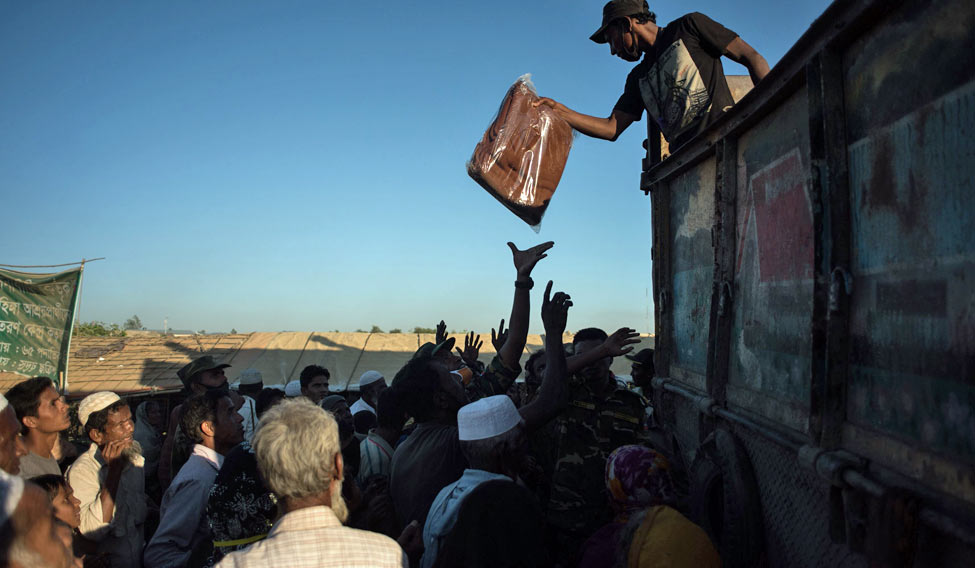Myanmar’s deal with Bangladesh to repatriate hundreds of thousands of Rohingyas has left many with more questions than answers.
All eyes and ears were on Pope Francis during his visit to Myanmar and Bangladesh, and whether or not he will use the word ‘Rohingya’. In a speech in Burma following a meeting with Aung San Suu Kyi on November 28, the pope refrained from using the term following a request from the local Roman Catholic Church. Citing concerns of setting off a diplomatic furore over ‘foreign meddling in domestic affairs’ and fears of repercussions that the use of the term could have for the 1.2% Catholic minority in the country, the Church instead persuaded the pope to use his speech to urge respect for minority rights.
Myanmar’s generals refuse to use the word Rohingya in the majority Buddhist country, and refer to the persecuted group as Bengalis — a reference to their supposed non-national status. The official non-recognition as a minority has laid the groundwork for the persecution of the Rohingya through law, policy and collective violence. An estimated 50% of all Rohingya villages lay empty, the populations driven out by force, and the villages burnt.
From a legal perspective and by Myanmar law, land, once burnt, reverts to ownership of the state. This raises the question to many regarding the “arrangement” made last week between Bangladesh and Myanmar’s government regarding repatriation of hundreds of thousands of Rohingyas to Myanmar. "It is completely premature to be talking about returning when hundreds of the Rohingya continue to flee persecution and arrive in Bangladesh on an almost daily basis," a spokesperson from Amnesty International said. Most refugees desperately want to go home, and will do so voluntarily when it’s safe. However, voluntary repatriation is clearly not an option here for the Rohingya who, thanks to Myanmar, don’t have a country of origin and are truly stateless.
Elsewhere across the globe, forced or involuntary repatriations of large groups of people would be considered deportation, or at worst, refoulement. Non-refoulement, which prohibits the expulsion, deportation, return, or extradition of refugees back to their country of origin where there is risk of persecution, is one of the fundamental principles of international law. Countries across the world have submitted varied responses and interpretations of international law with an eye on their own national interests. When the EU signed a deal with Turkey in 2016 to stem the waves of Syrian refugees headed for Europe in return for financial incentives, UNHCR issued a statement opposing it on the grounds that it violated the principle of non-refoulement. Turkey chose to believe that it did comply. Sometimes, refoulement becomes an international policy issue when governments choose to forcibly return refugees to countries they deem safe — the Vietnamese in Hong Kong and the Rwandans in Tanzania are examples.
India, which is one of the players in the Rohingya crisis and has always supported non-refoulement, appears to have reversed its position under the Narendra Modi government. Over the last two decades, India has touted its support strongly at international conventions, but the current administration believes that it is not obliged to comply based on the difference between ‘refugees’ and ‘migrants’. India’s opposition appears to be related to its national security concerns, and believes that it has the right to deny or admit migrants (in contrast to official refugees who apply for political asylum) in the interest of secure borders. While most of the Rohingya have made a beeline for Bangladesh, India has reluctantly absorbed approximately 45,000 refugees including 16,500 Rohingya refugees who are registered with UNHCR with official identification. Two of these Rohingya Muslims filed a writ petition against their proposed deportation with the Supreme Court of India, and preliminary arguments were heard on October 3. While the Rohingya petition aimed to showcase the violation of their fundamental rights, the government counter-argued that the court had jurisdiction only regarding ‘fundamental rights of Indian citizens’ and that government policy could vary from case to case “in larger national interest”. The tone reeks of indifference and a double standard: In 2015, the government amended the Passport Rules, 1950, and the Foreigners Order 1948, to exempt minority communities in Pakistan and Bangladesh seeking shelter in India due to persecution, thereby making this ‘class of foreigners’ eligible for long-term visas. Policy shouldn’t determine the status of minimal fundamental rights; it should be the other way around. In this case, the Rohingya, who are labeled as the world’s most persecuted minority, don’t appear to be eligible. Why?
Kelsey LeBrun Keswani is the co-founder and executive director of Refugee Assistance and Information Network International, and provides consultation on humanitarian issues globally .
Disclaimer: The views expressed in this article are solely those of the author and do not necessarily represent the views of the publication





